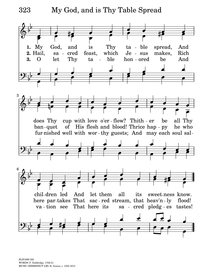Go Ad-Free
If you regularly use Hymnary.org, enhance your experience with Hymnary Pro—ad-free browsing plus powerful tools for planning, discovery and customization.
If you regularly use Hymnary.org, enhance your experience with Hymnary Pro—ad-free browsing plus powerful tools for planning, discovery and customization.

1 My God, and is thy table spread,
and doth thy cup with love o'erflow?
Thither be all thy children led,
and let them all thy sweetness know.
2 Hail, sacred feast which Jesus makes,
rich banquet of his flesh and blood!
Thrice happy he who here partakes
that sacred stream, that heavenly food.
3 Why are its bounties all in vain
before unwilling hearts displayed?
Was not for them the Victim slain?
Are they forbid the children's bread?
4 O let thy table honoured be,
and furnished well with joyful guests;
and may each soul salvation see,
that here its sacred pledges tastes.
Source: Ancient and Modern: hymns and songs for refreshing worship #455
 Philip Doddridge (b. London, England, 1702; d. Lisbon, Portugal, 1751) belonged to the Non-conformist Church (not associated with the Church of England). Its members were frequently the focus of discrimination. Offered an education by a rich patron to prepare him for ordination in the Church of England, Doddridge chose instead to remain in the Non-conformist Church. For twenty years he pastored a poor parish in Northampton, where he opened an academy for training Non-conformist ministers and taught most of the subjects himself. Doddridge suffered from tuberculosis, and when Lady Huntington, one of his patrons, offered to finance a trip to Lisbon for his health, he is reputed to have said, "I can as well go to heaven from Lisbon as from Nort… Go to person page >
Philip Doddridge (b. London, England, 1702; d. Lisbon, Portugal, 1751) belonged to the Non-conformist Church (not associated with the Church of England). Its members were frequently the focus of discrimination. Offered an education by a rich patron to prepare him for ordination in the Church of England, Doddridge chose instead to remain in the Non-conformist Church. For twenty years he pastored a poor parish in Northampton, where he opened an academy for training Non-conformist ministers and taught most of the subjects himself. Doddridge suffered from tuberculosis, and when Lady Huntington, one of his patrons, offered to finance a trip to Lisbon for his health, he is reputed to have said, "I can as well go to heaven from Lisbon as from Nort… Go to person page >| First Line: | My God, and is Thy table spread? |
| Title: | My God, And Is Thy Table Spread |
| Author: | Philip Doddridge (1755) |
| Meter: | 8.8.8.8 |
| Language: | English |
| Copyright: | Public Domain |
| Liturgical Use: | Communion Songs |
My God, and is Thy table spread, p. 779, i. In the 1904 ed. of Hymns Ancient & Modern, the doxology in the old ed. has been replaced by the concluding stanza of Doddridge's hymn.
--John Julian, Dictionary of Hymnology, New Supplement (1907)


 My Starred Hymns
My Starred Hymns